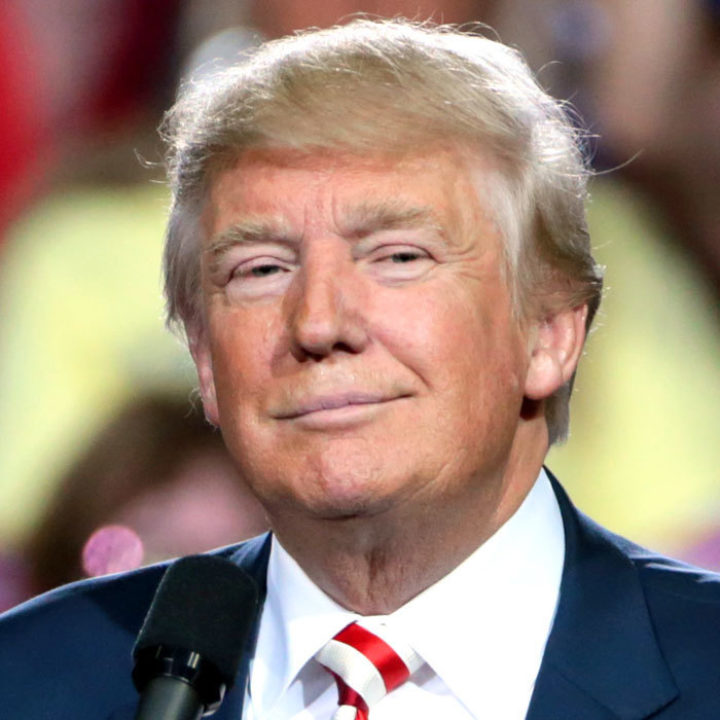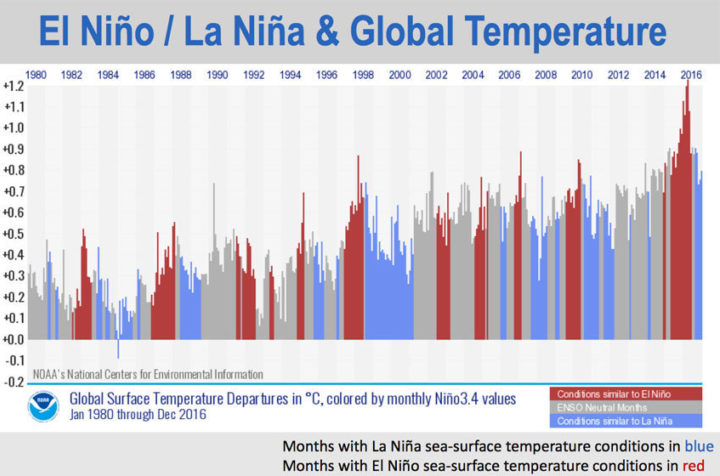Trump: No more Donald the Denier?
President softens his line on climate change, driven by real-world events and rising public concern
By Richard Black
Share
Last updated:
By Richard Black, ECIU Director
At the internal Conservative Party leadership hustings back in July, Theresa May is reported to have observed, after promising that the UK would remain a global leader on climate change on her watch, that the issue hadn’t been in the news that much.
Crikey, neither she nor anyone else could make that observation right now. Frankly it’s been hard to know which way to look these last few days, for fear of missing a development somewhere else.
- 2016 continued the trend of record-breaking warm years – and although El Nino played a role, it was very much a supporting one.
- In Washington, a series of Congressional hearings probed Donald Trump’s chosen top team on their approach to the scientific evidence on climate change - just as an opinion survey revealed that Americans' concern about climate change has hit a 10-year high
- In Britain, the government declared that several aspects of British life – health facilities, the coast, food supplies – will be progressively threatened by warming air, rising seas and flooding.
- The Scottish government set a stunning new target for cutting emissions – a two-thirds cut from 1990 levels by 2030, genuinely in the top few worldwide.
- And in Davos, after he’d finished making the case for world trade, Chinese President Xi Jinping lined up four-square behind the Paris Agreement – walking away would ‘endanger future generations’, he said – while at home, his government cancelled a hundred or so coal-fired power stations. (Just the hundred; no biggie.)
And by the time next week begins in earnest, Mr Trump will have taken his place in the Oval Office as the least likely, least predictable and least popular new arrival in living memory.
So – don’t look away. Things are going to – erm – hot up.
From the top down
One thing we can say for sure is that whatever the Trump administration eventually does on climate change and clean energy, it will be largely determined by the über-politics.

For example, as The Hill revealed, cuts to some programmes are coming, not from ideology on climate change but from the over-riding desire to reduce government spending. When this happens, it’s important to consider the implications – but not to see it as a fundamental change of direction on climate policy.
The same is true in the UK. On the macro-scale, climate policy is secure, underpinned by the Climate Change Act to which both the government and the vast majority of MPs are committed.
But pragmatic moves in energy policy designed to ensure security of supply at the lowest cost, such as electrical interconnectors and shared gas storage, could fall prey to the overall Brexit narrative unless ministers and civil servants are careful. It’s collateral damage, rather than a surgical strike.
A heck of a lot has been written about Donald Trump’s historical approach to climate change. But that too needs, I would argue, to be seen through a macro-lens. Whatever else the President may be, he is undoubtedly a fantastic self-publicist – and fantastical tweets on climate change garner as much attention as those on anything else.
I suspect the reality is that like a heck of a lot of politicians, Mr Trump doesn’t particularly care either way. And on issues that they don’t really care about, politicians generally take positions based on politics rather than evidence.
Coal: still heading for the slag heap
From the vantage point of a coal company boss or a libertarian think-tank, it might look as though the politics are inexorably swinging in favour of promoting fossil fuels and cutting back on clean energy.
But in the real world, things look rather different.

As I’ve written before, a number of US states are committed to a smart grid future, based around renewable generation and including electric vehicles both as transport and units of storage. They’re doing it through concern over air pollution and climate change, because their citizens want it, and because on a time horizon of a couple of decades it makes economic sense. Four years of a Trump administration can’t change that, just as it can’t reboot the coal industry.
And out there in the real world, Americans are becoming more and more concerned about climate change.
Young Republicans have known for a couple of years that this removes outright climate denial as a tenable policy position – and, judging by the Congressional hearings for Mr Trump’s nominees, the older ones have cottoned on. All the nominees said pretty much the same thing – almost as though ‘message management’ was going on. And the message is that climate change is real. They're a long way away from singing the Greenpeace hymn sheet, and always will be - but the outright denialism that many nominees displayed even a few months back just isn't going to wash.
Logic suggests that the main reason for Americans’ rising concern is the growing evidence of climate impacts from the natural world.
A sequence of warmest ever years, increased linking of climate change to risk of fires and drought, spectacular melt rates in the Arctic, the ocean acidification impacts to US West Coast aquaculture… if Harold Macmillan was correct in saying events are what blows politics off course, that applies just as much to striking climate change signals as striking miners.
A fool's game
For all the influence they have mustered over the last decade, the reality climate sceptics have to face is that one by one, their arguments have fallen down.

Which is not to say they’re not still being made. Some newspaper editors still employ the odd columnist capable of writing, with a straight face, that China and India will build hundreds of coal-fired power stations.
The ‘global warming pause’ is still being touted – but with less and less scholarship behind it, attracting more and more ridicule in the process. As the saying goes, you can’t fool all of the people all of the time. And trying to keep doing it as the evidence gets flimsier and flimsier just makes a fool out of you.
For all of these reasons, I’m not anticipating a massive change in the US approach to climate change during the Trump years. The über-politics mean some cuts, for sure, and a probable end to the Federal-level clean energy push, which will inevitably slow change down.
But the changing economics of energy systems can’t be reversed. Public appetite for clean air and cool things like electric cars can’t be wished away. Wall or no wall, Trump’s America will still need friends overseas.
Donald Trump may have changed the rules of politics. But he hasn’t changed its laws.
Share